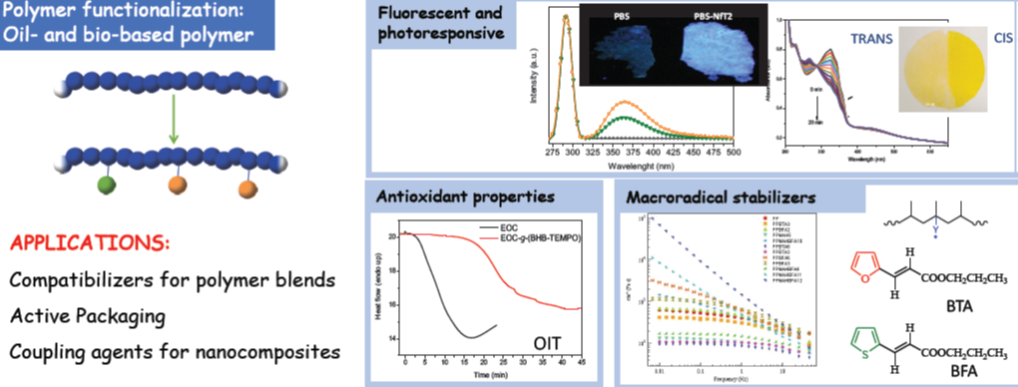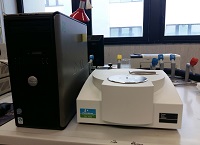Polymeric Materials Chemistry Laboratory (PMC-Lab)
 The PMC-Lab group, located within the CNR-ICCOM Pisa Secondary Site, is currently composed of three permanent researchers and one laboratory technician. The group is interested in polymer functionalization by post-polymerization methods, polymer blends, polymer composites and nanocomposites from bio-based and petroleum-derived polymers. Particular focus is on the immobilization of active species in 2D layered materials by intercalation and surface decoring. The PMC-Lab group is also interested in developing new sustainable polymer materials by the use of bio-based polymers and bio-additives, and by promoting polymer recycling. Potential target applications include packaging, automotive, and building sectors.
The PMC-Lab group, located within the CNR-ICCOM Pisa Secondary Site, is currently composed of three permanent researchers and one laboratory technician. The group is interested in polymer functionalization by post-polymerization methods, polymer blends, polymer composites and nanocomposites from bio-based and petroleum-derived polymers. Particular focus is on the immobilization of active species in 2D layered materials by intercalation and surface decoring. The PMC-Lab group is also interested in developing new sustainable polymer materials by the use of bio-based polymers and bio-additives, and by promoting polymer recycling. Potential target applications include packaging, automotive, and building sectors.
The research and development activities of the PMC-Lab group focus on the following main topics:
(1) Polymer functionalization (from oil and bio-based sources) by post-polymerization modification methods. The main goal is to insert functional groups on the polymer chain to exert specific functions transferred from the functional low molecular weight molecules to the polymer matrix. A significant effort is dedicated to developing new routes to finely control both the final composition and macromolecular architecture by minimizing side reactions. Both bulk and surface functionalization methods (by UV and Plasma activation) are investigated.
(2) Multifunctional polymer nanocomposites: the preparation of nanocomposites is another effective tool to modify and tune polymer properties. The morphology is controlled by modulating the mixing conditions and using suitable compatibilizers. In this way, highly performant nanocomposites having improved barrier, and thermomechanical features can be obtained. In addition, one of the investigated aspects is polymer-filler interactions and the effects of polymer chain confinement on structure-property relationships.
(3) Polymer blends: the development of compatibilized polymer blends by creating an active and thick interface is a field of interest of the group. Advance methods based on reactive blending and reactor blending technologies are adopted. In addition, the use of ad-hoc selected polymer compatibilizers allows optimizing interfacial interactions and final performances. The results of these studies find application in the field of mechanical recycling of plastics.
(4) 2D materials: phyllosilicates, layered double hydroxides and 2D-black phosphorus are of interest in the PMC-LAB. The design and preparation of functional systems by intercalation and/or immobilization of functional species (i.e. antimicrobial, antioxidant, etc.) in phyllosilicates and layered double hydroxides leading to active host-gest systems are studied. Alternatively, the decoring of the surface of 2D-black phosphorus with active species is applied. Furthermore, the intercalation, delamination, and stabilization of 2D solids by in-situ polymerization or dispersion in polymer matrices leading to tailored structure having electronic, optical and other functional properties are investigated by the PMC-Lab.
(5) Developing of new sustainable polymer-based materials by recycling and use of eco-friendly polymer matrices and additives. Attention is devoted to the possible use of additives derived from renewable resources and extractable from wastes of the food chain.
Education in the field of materials science: educational/training activities for graduate and PhD students; courses in chemistry of polymer materials for MS and PhD degrees in Chemistry and Industrial Chemistry. Supervision of bachelor and master thesis.
Service provided to industry: the PMC-Lab group provides polymer-based materials preparation consultancy, characterization and testing services; PMC-Lab offers in general support to companies and public organization in the field of polymer materials promoting research and development, technology transfer and dissemination of information concerning functionalized polymers, nanocomposites and their technologies of preparation.

Areas of application
- Polymer functionalization
- 2D materials
- Multifunctional nanocomposites from oil and bio-based polymers:
- Compatibilization and polymer blending
- Sustainable polymer materials
Expertise
- Functionalization of oil and bio-based polymers by radical functionalization reactions
- Polymer surface modification by photo-grafting and plasma treatment
- Characterization of polymers by FT-IR, TGA, DSC, SEC, UV-VIS and fluorescence emission spectroscopy
- Organo modification of lamellar clays with functional molecules and study of their dispersion and activity in polymer matrices
- Exfoliation, embedding in polymer matrix, and decoring of 2D-black phosphorus,
- Study of compatibilization of polymer blends also from recycled plastics
- Study of the structure/property relationship
Instruments
- Differential Scanning Calorimetry DSC 4000 Perkin Elmer

- Thermogravimetric analyzer TG/DTA 7200 Exstar
- FT-IR spectrophotometer Perkin Elmer Spectrum Two with ATR accessory
- UV-Visible spectrophotometer Jasco V-750 with integrating sphere
- Spectrofluorometer Horiba FluoroMaxPLUS-TCSPC
- Size exclusion chromatography Agilent Technologies 1260 Infinity with RID and UV detectors
- Camera UVA-CUBE Honle, with H 400F/2 and F 400F/2 lamps
- Carver 3851-0 hot press
- INTRON testing system for tensile texts (5960 series)
- Low-pressure plasma chamber, Tucano model Gambetti Kenologia
- Ultrasonic Processor Hielscher UP200St
Permanent Staff
- Francesca Cicogna, Researcher
- Serena Coiai, Researcher
- Elisa Passaglia, Research Director
- Roberto Spiniello, Laboratory technician
